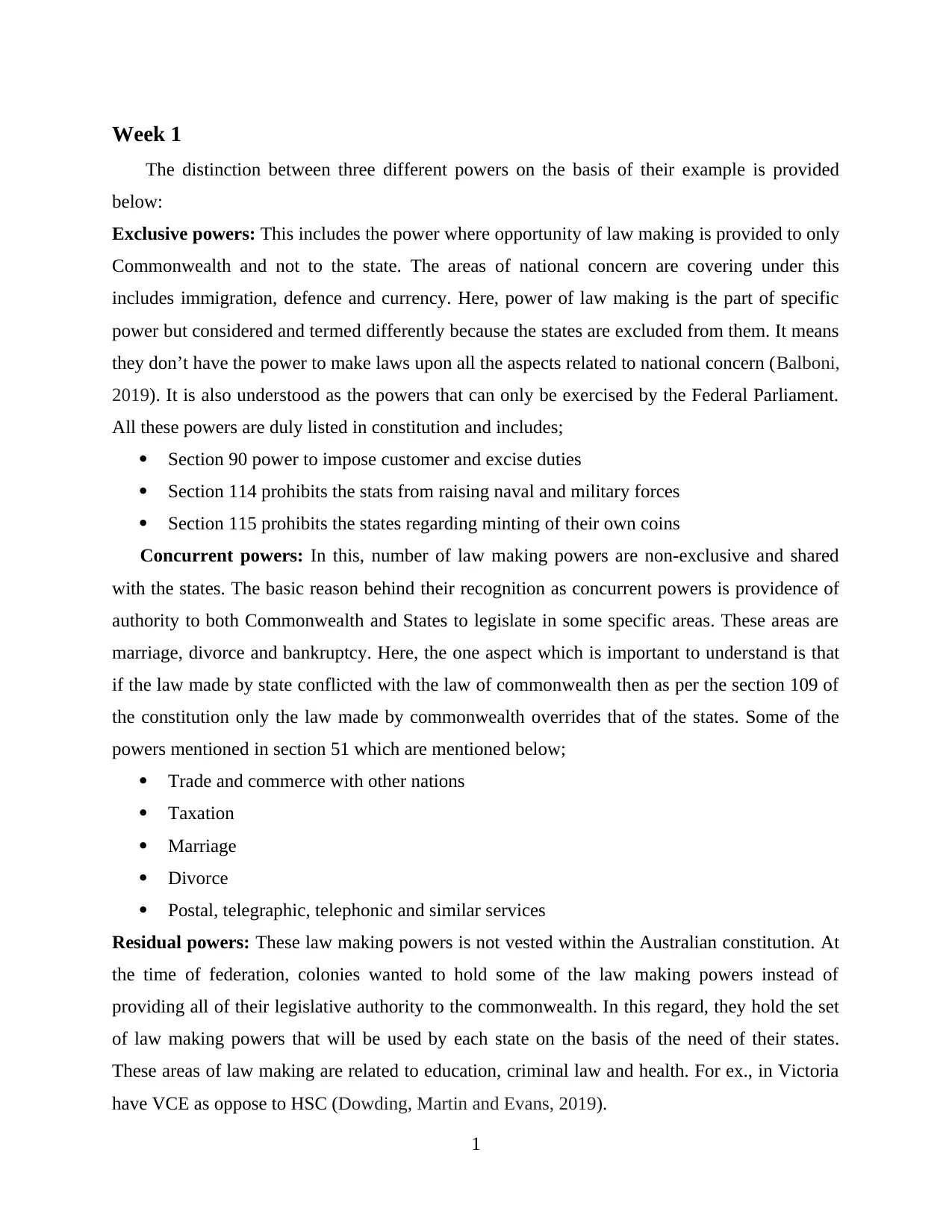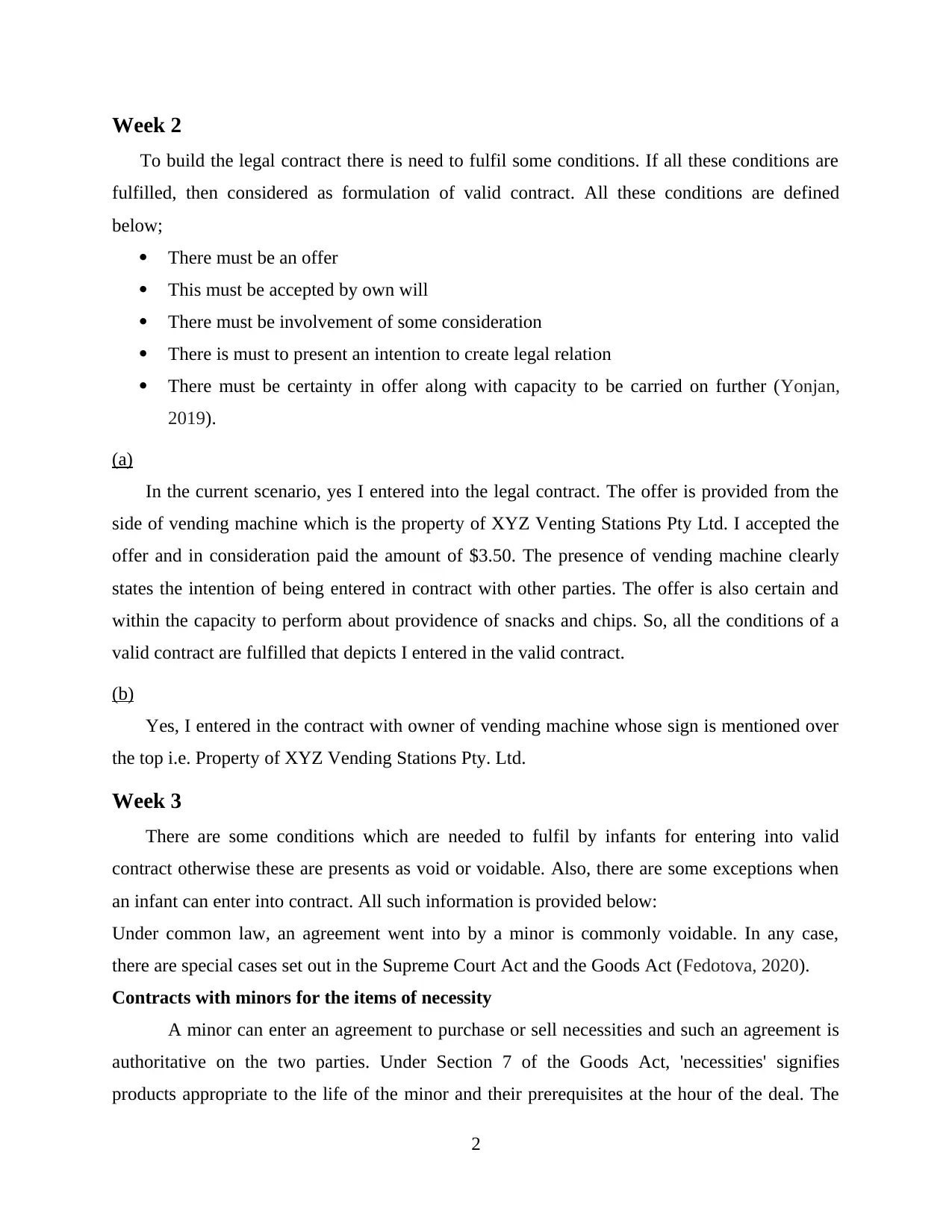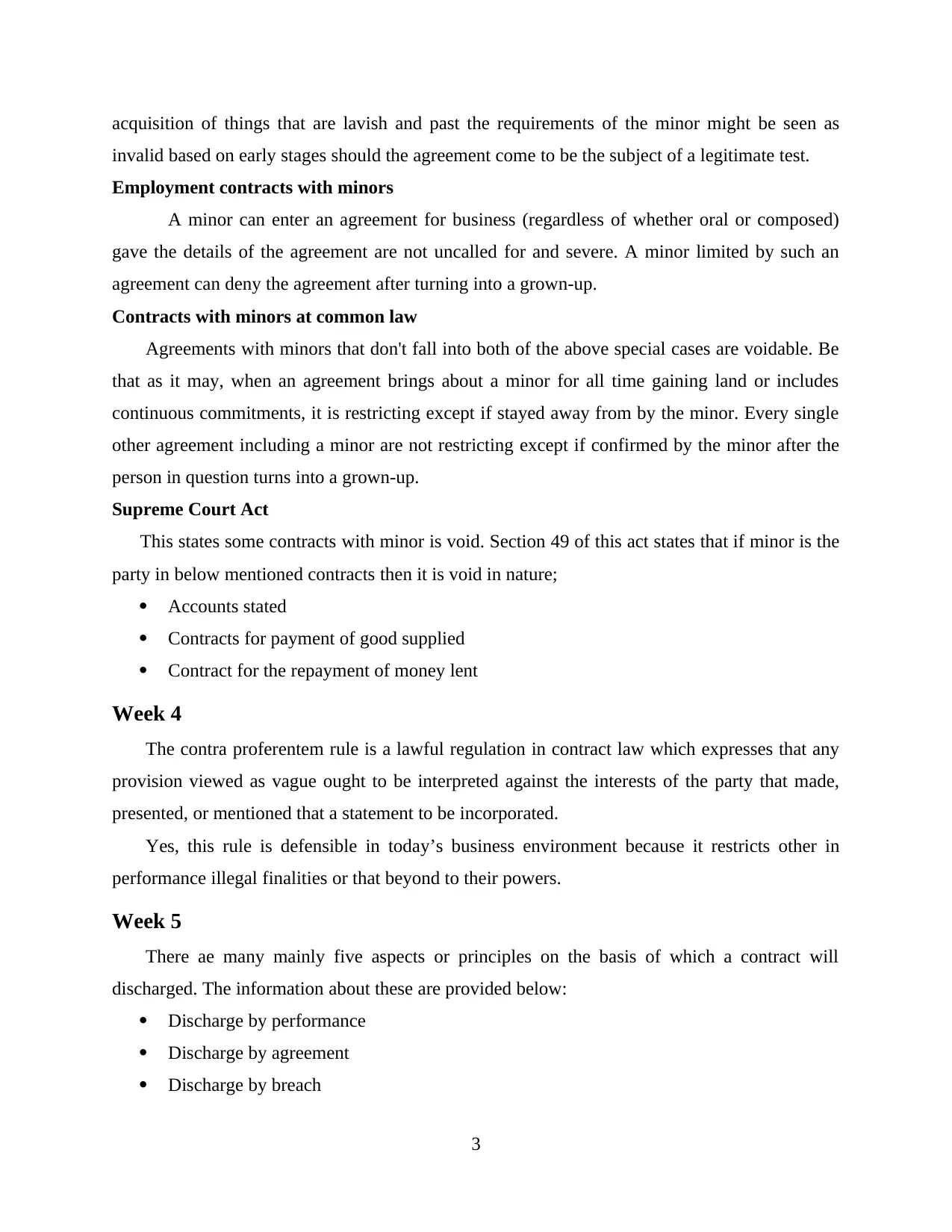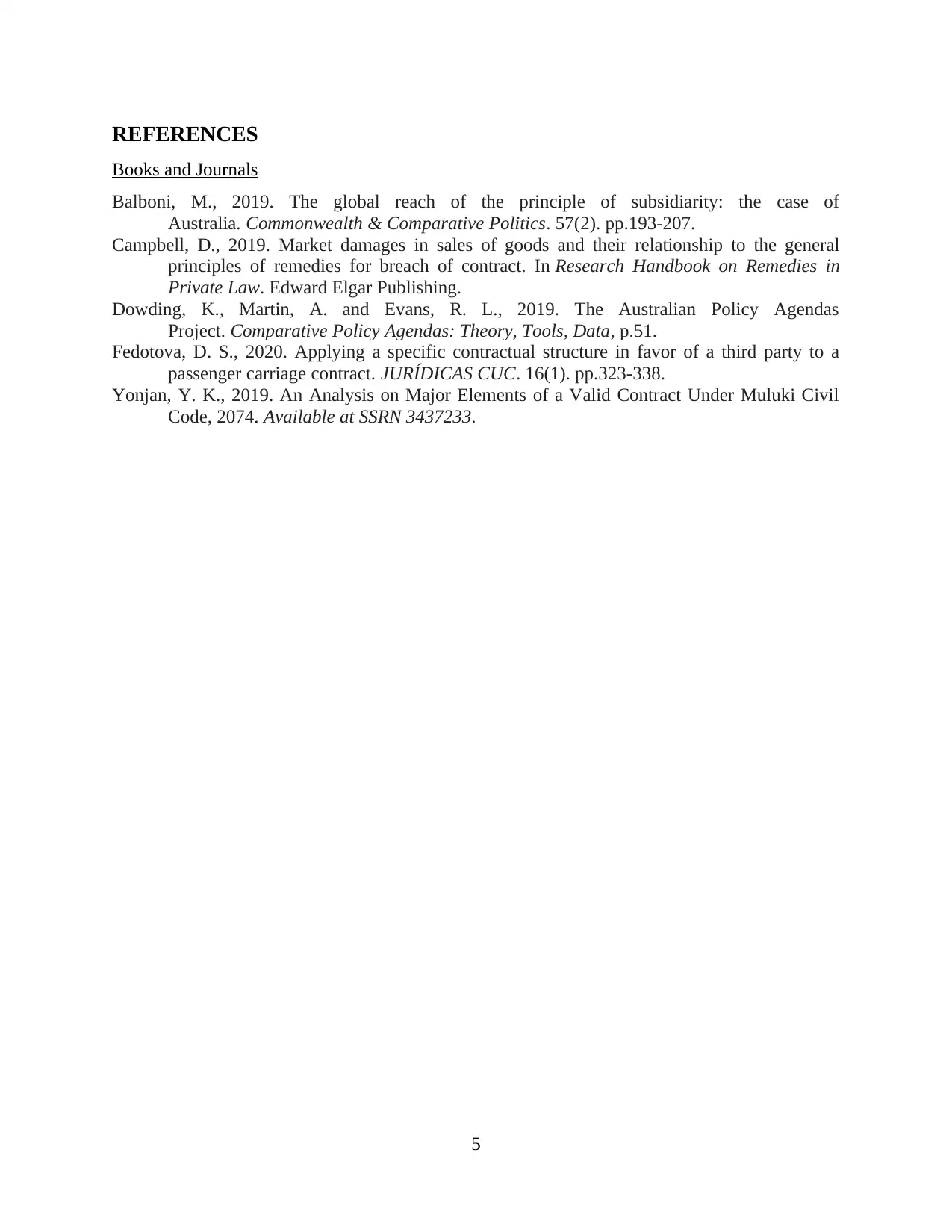Legal Contracts: Australian Law on Powers, Conditions, and Discharge
VerifiedAdded on 2023/01/11
|7
|1394
|64
Homework Assignment
AI Summary
This assignment delves into the intricacies of legal contracts, beginning with an analysis of the three distinct powers: exclusive, concurrent, and residual, within the Australian legal framework. It then outlines the essential conditions required for a valid contract, including offer, acceptance, consideration, intention to create legal relations, and certainty, using a vending machine scenario to illustrate these principles. The assignment further explores the legal capacity of minors to enter into contracts, detailing exceptions and relevant legislation such as the Goods Act and the Supreme Court Act. The contra proferentem rule is examined for its relevance in the modern business environment, followed by a comprehensive overview of contract discharge, including performance, agreement, breach, and frustration, with a practical example. The assignment concludes with a reference list of relevant sources.

Questions
Paraphrase This Document
Need a fresh take? Get an instant paraphrase of this document with our AI Paraphraser

Contents
Week 1.............................................................................................................................................1
Week 2.............................................................................................................................................2
(a).................................................................................................................................................2
(b).................................................................................................................................................2
Week 3.............................................................................................................................................2
Week 4.............................................................................................................................................3
Week 5.............................................................................................................................................3
REFERENCES................................................................................................................................5
Week 1.............................................................................................................................................1
Week 2.............................................................................................................................................2
(a).................................................................................................................................................2
(b).................................................................................................................................................2
Week 3.............................................................................................................................................2
Week 4.............................................................................................................................................3
Week 5.............................................................................................................................................3
REFERENCES................................................................................................................................5

Week 1
The distinction between three different powers on the basis of their example is provided
below:
Exclusive powers: This includes the power where opportunity of law making is provided to only
Commonwealth and not to the state. The areas of national concern are covering under this
includes immigration, defence and currency. Here, power of law making is the part of specific
power but considered and termed differently because the states are excluded from them. It means
they don’t have the power to make laws upon all the aspects related to national concern (Balboni,
2019). It is also understood as the powers that can only be exercised by the Federal Parliament.
All these powers are duly listed in constitution and includes;
Section 90 power to impose customer and excise duties
Section 114 prohibits the stats from raising naval and military forces
Section 115 prohibits the states regarding minting of their own coins
Concurrent powers: In this, number of law making powers are non-exclusive and shared
with the states. The basic reason behind their recognition as concurrent powers is providence of
authority to both Commonwealth and States to legislate in some specific areas. These areas are
marriage, divorce and bankruptcy. Here, the one aspect which is important to understand is that
if the law made by state conflicted with the law of commonwealth then as per the section 109 of
the constitution only the law made by commonwealth overrides that of the states. Some of the
powers mentioned in section 51 which are mentioned below;
Trade and commerce with other nations
Taxation
Marriage
Divorce
Postal, telegraphic, telephonic and similar services
Residual powers: These law making powers is not vested within the Australian constitution. At
the time of federation, colonies wanted to hold some of the law making powers instead of
providing all of their legislative authority to the commonwealth. In this regard, they hold the set
of law making powers that will be used by each state on the basis of the need of their states.
These areas of law making are related to education, criminal law and health. For ex., in Victoria
have VCE as oppose to HSC (Dowding, Martin and Evans, 2019).
1
The distinction between three different powers on the basis of their example is provided
below:
Exclusive powers: This includes the power where opportunity of law making is provided to only
Commonwealth and not to the state. The areas of national concern are covering under this
includes immigration, defence and currency. Here, power of law making is the part of specific
power but considered and termed differently because the states are excluded from them. It means
they don’t have the power to make laws upon all the aspects related to national concern (Balboni,
2019). It is also understood as the powers that can only be exercised by the Federal Parliament.
All these powers are duly listed in constitution and includes;
Section 90 power to impose customer and excise duties
Section 114 prohibits the stats from raising naval and military forces
Section 115 prohibits the states regarding minting of their own coins
Concurrent powers: In this, number of law making powers are non-exclusive and shared
with the states. The basic reason behind their recognition as concurrent powers is providence of
authority to both Commonwealth and States to legislate in some specific areas. These areas are
marriage, divorce and bankruptcy. Here, the one aspect which is important to understand is that
if the law made by state conflicted with the law of commonwealth then as per the section 109 of
the constitution only the law made by commonwealth overrides that of the states. Some of the
powers mentioned in section 51 which are mentioned below;
Trade and commerce with other nations
Taxation
Marriage
Divorce
Postal, telegraphic, telephonic and similar services
Residual powers: These law making powers is not vested within the Australian constitution. At
the time of federation, colonies wanted to hold some of the law making powers instead of
providing all of their legislative authority to the commonwealth. In this regard, they hold the set
of law making powers that will be used by each state on the basis of the need of their states.
These areas of law making are related to education, criminal law and health. For ex., in Victoria
have VCE as oppose to HSC (Dowding, Martin and Evans, 2019).
1
⊘ This is a preview!⊘
Do you want full access?
Subscribe today to unlock all pages.

Trusted by 1+ million students worldwide

Week 2
To build the legal contract there is need to fulfil some conditions. If all these conditions are
fulfilled, then considered as formulation of valid contract. All these conditions are defined
below;
There must be an offer
This must be accepted by own will
There must be involvement of some consideration
There is must to present an intention to create legal relation
There must be certainty in offer along with capacity to be carried on further (Yonjan,
2019).
(a)
In the current scenario, yes I entered into the legal contract. The offer is provided from the
side of vending machine which is the property of XYZ Venting Stations Pty Ltd. I accepted the
offer and in consideration paid the amount of $3.50. The presence of vending machine clearly
states the intention of being entered in contract with other parties. The offer is also certain and
within the capacity to perform about providence of snacks and chips. So, all the conditions of a
valid contract are fulfilled that depicts I entered in the valid contract.
(b)
Yes, I entered in the contract with owner of vending machine whose sign is mentioned over
the top i.e. Property of XYZ Vending Stations Pty. Ltd.
Week 3
There are some conditions which are needed to fulfil by infants for entering into valid
contract otherwise these are presents as void or voidable. Also, there are some exceptions when
an infant can enter into contract. All such information is provided below:
Under common law, an agreement went into by a minor is commonly voidable. In any case,
there are special cases set out in the Supreme Court Act and the Goods Act (Fedotova, 2020).
Contracts with minors for the items of necessity
A minor can enter an agreement to purchase or sell necessities and such an agreement is
authoritative on the two parties. Under Section 7 of the Goods Act, 'necessities' signifies
products appropriate to the life of the minor and their prerequisites at the hour of the deal. The
2
To build the legal contract there is need to fulfil some conditions. If all these conditions are
fulfilled, then considered as formulation of valid contract. All these conditions are defined
below;
There must be an offer
This must be accepted by own will
There must be involvement of some consideration
There is must to present an intention to create legal relation
There must be certainty in offer along with capacity to be carried on further (Yonjan,
2019).
(a)
In the current scenario, yes I entered into the legal contract. The offer is provided from the
side of vending machine which is the property of XYZ Venting Stations Pty Ltd. I accepted the
offer and in consideration paid the amount of $3.50. The presence of vending machine clearly
states the intention of being entered in contract with other parties. The offer is also certain and
within the capacity to perform about providence of snacks and chips. So, all the conditions of a
valid contract are fulfilled that depicts I entered in the valid contract.
(b)
Yes, I entered in the contract with owner of vending machine whose sign is mentioned over
the top i.e. Property of XYZ Vending Stations Pty. Ltd.
Week 3
There are some conditions which are needed to fulfil by infants for entering into valid
contract otherwise these are presents as void or voidable. Also, there are some exceptions when
an infant can enter into contract. All such information is provided below:
Under common law, an agreement went into by a minor is commonly voidable. In any case,
there are special cases set out in the Supreme Court Act and the Goods Act (Fedotova, 2020).
Contracts with minors for the items of necessity
A minor can enter an agreement to purchase or sell necessities and such an agreement is
authoritative on the two parties. Under Section 7 of the Goods Act, 'necessities' signifies
products appropriate to the life of the minor and their prerequisites at the hour of the deal. The
2
Paraphrase This Document
Need a fresh take? Get an instant paraphrase of this document with our AI Paraphraser

acquisition of things that are lavish and past the requirements of the minor might be seen as
invalid based on early stages should the agreement come to be the subject of a legitimate test.
Employment contracts with minors
A minor can enter an agreement for business (regardless of whether oral or composed)
gave the details of the agreement are not uncalled for and severe. A minor limited by such an
agreement can deny the agreement after turning into a grown-up.
Contracts with minors at common law
Agreements with minors that don't fall into both of the above special cases are voidable. Be
that as it may, when an agreement brings about a minor for all time gaining land or includes
continuous commitments, it is restricting except if stayed away from by the minor. Every single
other agreement including a minor are not restricting except if confirmed by the minor after the
person in question turns into a grown-up.
Supreme Court Act
This states some contracts with minor is void. Section 49 of this act states that if minor is the
party in below mentioned contracts then it is void in nature;
Accounts stated
Contracts for payment of good supplied
Contract for the repayment of money lent
Week 4
The contra proferentem rule is a lawful regulation in contract law which expresses that any
provision viewed as vague ought to be interpreted against the interests of the party that made,
presented, or mentioned that a statement to be incorporated.
Yes, this rule is defensible in today’s business environment because it restricts other in
performance illegal finalities or that beyond to their powers.
Week 5
There ae many mainly five aspects or principles on the basis of which a contract will
discharged. The information about these are provided below:
Discharge by performance
Discharge by agreement
Discharge by breach
3
invalid based on early stages should the agreement come to be the subject of a legitimate test.
Employment contracts with minors
A minor can enter an agreement for business (regardless of whether oral or composed)
gave the details of the agreement are not uncalled for and severe. A minor limited by such an
agreement can deny the agreement after turning into a grown-up.
Contracts with minors at common law
Agreements with minors that don't fall into both of the above special cases are voidable. Be
that as it may, when an agreement brings about a minor for all time gaining land or includes
continuous commitments, it is restricting except if stayed away from by the minor. Every single
other agreement including a minor are not restricting except if confirmed by the minor after the
person in question turns into a grown-up.
Supreme Court Act
This states some contracts with minor is void. Section 49 of this act states that if minor is the
party in below mentioned contracts then it is void in nature;
Accounts stated
Contracts for payment of good supplied
Contract for the repayment of money lent
Week 4
The contra proferentem rule is a lawful regulation in contract law which expresses that any
provision viewed as vague ought to be interpreted against the interests of the party that made,
presented, or mentioned that a statement to be incorporated.
Yes, this rule is defensible in today’s business environment because it restricts other in
performance illegal finalities or that beyond to their powers.
Week 5
There ae many mainly five aspects or principles on the basis of which a contract will
discharged. The information about these are provided below:
Discharge by performance
Discharge by agreement
Discharge by breach
3

Discharge by frustration
In the current scenario, this falls under the category of discharge by frustration where economic
circumstances not allowing to continue the contract (Campbell, 2019). Here, Bryan can sue
Amina for remedy. If, Amina wants to safeguard her then must prove this will occur due to
indefinite situation.
4
In the current scenario, this falls under the category of discharge by frustration where economic
circumstances not allowing to continue the contract (Campbell, 2019). Here, Bryan can sue
Amina for remedy. If, Amina wants to safeguard her then must prove this will occur due to
indefinite situation.
4
⊘ This is a preview!⊘
Do you want full access?
Subscribe today to unlock all pages.

Trusted by 1+ million students worldwide

REFERENCES
Books and Journals
Balboni, M., 2019. The global reach of the principle of subsidiarity: the case of
Australia. Commonwealth & Comparative Politics. 57(2). pp.193-207.
Campbell, D., 2019. Market damages in sales of goods and their relationship to the general
principles of remedies for breach of contract. In Research Handbook on Remedies in
Private Law. Edward Elgar Publishing.
Dowding, K., Martin, A. and Evans, R. L., 2019. The Australian Policy Agendas
Project. Comparative Policy Agendas: Theory, Tools, Data, p.51.
Fedotova, D. S., 2020. Applying a specific contractual structure in favor of a third party to a
passenger carriage contract. JURÍDICAS CUC. 16(1). pp.323-338.
Yonjan, Y. K., 2019. An Analysis on Major Elements of a Valid Contract Under Muluki Civil
Code, 2074. Available at SSRN 3437233.
5
Books and Journals
Balboni, M., 2019. The global reach of the principle of subsidiarity: the case of
Australia. Commonwealth & Comparative Politics. 57(2). pp.193-207.
Campbell, D., 2019. Market damages in sales of goods and their relationship to the general
principles of remedies for breach of contract. In Research Handbook on Remedies in
Private Law. Edward Elgar Publishing.
Dowding, K., Martin, A. and Evans, R. L., 2019. The Australian Policy Agendas
Project. Comparative Policy Agendas: Theory, Tools, Data, p.51.
Fedotova, D. S., 2020. Applying a specific contractual structure in favor of a third party to a
passenger carriage contract. JURÍDICAS CUC. 16(1). pp.323-338.
Yonjan, Y. K., 2019. An Analysis on Major Elements of a Valid Contract Under Muluki Civil
Code, 2074. Available at SSRN 3437233.
5
1 out of 7
Related Documents
Your All-in-One AI-Powered Toolkit for Academic Success.
+13062052269
info@desklib.com
Available 24*7 on WhatsApp / Email
![[object Object]](/_next/static/media/star-bottom.7253800d.svg)
Unlock your academic potential
Copyright © 2020–2025 A2Z Services. All Rights Reserved. Developed and managed by ZUCOL.





